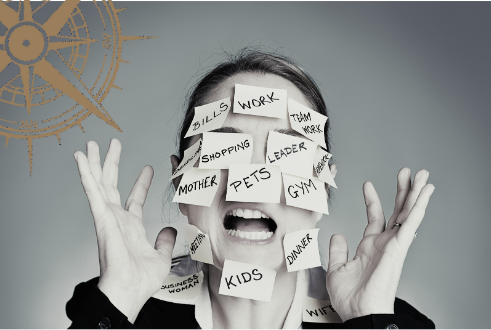Unveiling the Complexity of Human Behavior: The Power of Multiple Determinants
Understanding human behaviour is fascinating.
When you go down the rabbit hole of the mind and people, you’ll find that there is a myriad of factors that influence it.
There is one principle in psychology that I wanted to share with you that might help you to understand yourself a little more.
It is called multiple determinants, a concept that human behaviour is influenced by the interaction of multiple factors, past and present.
We might become a little rigid or fixated on the concept that we do not see things as they are, we see them as we are, and that our experience is a matter of perception.
But let’s define that as your internal world.
Our perception of the world is shaped not only by our internal world but also by our external world. The external world includes a multitude of factors that influence our behaviour and interpretations.
The concept of multiple determinants emphasizes that our behaviour is influenced by biological, psychological, social, and environmental factors.
These determinants interact to shape our unique perspectives and interpretations of the world. Our biological makeup, cognitive processes, social interactions, and environmental context all contribute to how we perceive and understand our experiences.
Let’s explore each a little more,
- Biological Factors: Our genetic makeup, brain structure, and physiological processes significantly impact our behaviour.
- Psychological Factors: Our thoughts, emotions, and cognitive processes play a crucial role in understanding behaviour. Our interpretations of events, cognitive biases, and unconscious motivations all contribute to how we perceive and respond to the world around us.
- Social Factors: The people and social environments we encounter influence our behaviour. Social norms, cultural values, family dynamics, peer pressure, and societal expectations shape our actions, attitudes, and decisions. We are social creatures, and our interactions with others can greatly impact our behaviour.
- Environmental Factors: Our physical surroundings, including our home, workplace, and community, have a significant influence on our behaviour. Environmental factors such as access to resources, socio-economic conditions, and exposure to stressors can shape our choices and opportunities.
Acknowledging the role of multiple determinants in perception rather than only your inner world perspective encourages you to consider the complexities and influences that contribute to our individual perspectives, leading to a more nuanced understanding of ourselves and the world around us.
What is even more interesting is that when it comes to solving a program, there is not a single process that will work for everyone.
If you consider the different variables:
- Our genetic makeup
- brain structure,
- physiological
- Our thoughts
- Emotions
- Cognitive processes (which there are squillions)
- Interpretations of events
- Cognitive biases (lots of these)
- Social environments
- Social norms
- Cultural values
- Family dynamics
- Peer pressure
- Societal expectations
- Physical surroundings
- Access to resources
- Socio-economic conditions
Let’s look at an example
CLIENT A: has financial struggles and has very little income coming through the door.
Client A’s financial struggles and limited income can be understood as a result of various interacting factors. Let’s consider some of the determinants that may contribute to their specific situation:
- Biological Determinants: Biological factors can play a role in Client A’s financial struggles. For instance, their physical health or disabilities may affect their ability to work and earn income.
- Psychological Determinants: Psychological factors can influence how Client A manages their financial situation. Their attitudes, beliefs, and mindset about money, as well as their decision-making processes, financial literacy, and self-control, can impact their ability to generate income, save, or effectively manage their finances.
- Social Determinants: Social factors play a significant role in Client A’s financial situation. Their social support network, access to educational opportunities, employment prospects, and socio-economic background can affect their income potential.
- Environmental Determinants: Environmental factors also contribute to Client A’s financial struggles. The local job market, economic conditions, cost of living, and availability of resources in their community can impact their ability to find employment or generate sufficient income. Additionally, factors such as affordable housing, access to transportation, and the availability of social welfare programs can influence their financial stability.
You’ll often hear me say “Let’s find the problem under the problem.” This is what is in my mind when I am searching for a deeper issue.
It is important to note that these determinants do not operate in isolation but interact with and influence each other.
Client A’s limited income might lead to increased stress and mental health challenges (psychological determinant), which in turn could affect their ability to find and maintain employment (social determinant). These determinants work together in a complex manner to shape Client A’s financial situation.
So as you can see, human behaviour is complex and one quest doesn’t fix one problem.
If it was – how easy would it be.
What is important to remember is our perception is not fixed but is an ever-evolving result of a dynamic interplay between various determinants.
In the classes and coaching sessions, I sometimes hear clients give more weight to their minds and psychological factors of why their life is the way that it is.
But the list above shows so many factors at play and gives a beautiful demonstration of why human behaviour is complex, and you might find yourself working on the same issue for weeks and months (and let’s face it, sometimes years).
This is because of all the nuances and factors that are at play for the one issue.
I’d love to open you up to the concept of multiple determinants and their significance in psychology allowing you to have deeper insights into your own behaviour and look at your challenges more broadly.
So when you are unpacking your challenges, remember the principle of multiple determinants which is that human behaviour is not determined by a single factor (ie your mindset), but rather by a combination of various influences.
The principle of multiple determinants reminds us that human behaviour is shaped by a multitude of factors, both internal and external, which influence our perceptions and experiences.
It encourages us to move beyond a narrow focus on any single aspect and recognize the intricate interplay of various influences.
As the philosopher Arthur Schopenhauer once wrote, “Every person takes the limits of their own field of vision for the limits of the world.”
This quote highlights the inherent subjectivity of our perception.
It suggests that our understanding of the world is limited to our own unique perspective, influenced by the multiple determinants that shape our thoughts and experiences.
By embracing the concept of multiple determinants, we become more aware of the diversity of factors that contribute to human behaviour, expanding our understanding of ourselves and the world around us.
It reminds us to approach others with an open mind, recognizing that their perception of the world is shaped by their own set of determinants.
Through this awareness, we can cultivate a greater understanding and appreciation for the complexities of human behaviour and the diversity of human experiences.
Inspiring love and connection,
Tanya x
Leadership Coach & Master Certified Demartini Method Facilitator
BAppSoSc (Counselling)



